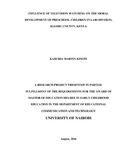| dc.contributor.author | Kaburia, Martin Kinoti | |
| dc.date.accessioned | 2016-11-23T13:57:15Z | |
| dc.date.available | 2016-11-23T13:57:15Z | |
| dc.date.issued | 2016 | |
| dc.identifier.uri | http://hdl.handle.net/11295/97789 | |
| dc.description.abstract | The moral development of the preschool child in Kenya is threatened by exposure to an increasing variety of content arising from the licensing of transmitters of a wide variety of television channels. The child is exposed to the aired content in an uncontrolled environment with modern television equipment. The child's moral development is threatened with the child helpless growing up in such an environment and it is, therefore, necessary that this threat to the child is brought to light. This research aimed at establishing the influence of watching television on the moral development of the preschool child. The study had three specific objectives: to establish the influence of television content on the moral development of preschool children; to establish the influence of the length of exposure time to television on the moral development of preschool children; and ascertain how television programs a preschool child is exposed to influence its moral development. A descriptive exploratory study was used to achieve the three objectives. The study was conducted in Lari Division of Kiambu County. The target population was made up of the 338 preschool children in the 10 registered private schools in Lari Division. Stratified random sampling was used to obtain the target sample of 78 children with their parents. One teacher from each of the school participated in the research. Those who actually participated in the research were 60 children, 60 parents and 10 teachers making a response rate of 76.9 percent. Data were collected by use of questionnaires for the teachers and for the parents and preschool children. Analysis of the data was done using graphical presentations, mean, percentages and regression. The analysis established that television content influence the moral development of a preschool child who is exposed to it. Television exposure time also influence the moral development of preschool children. Thirdly, the study also established that television program types influence the moral development of preschool children. This study recommends a national policy be put in place to guide television program transmitters regarding how they can make programs that bear in mind the needs of preschool children. Parents and teachers should team up to develop programs that will keep children active to reduce their affinity to watching television. Keeping the children active at home and at school will reduce the amount of time used watching television. Parents have to be sensitized regarding programs their children watch when they are left to watch what they want on their own and how to take appropriate action to prevent children being addicted to television. | en_US |
| dc.language.iso | en | en_US |
| dc.publisher | University Of Nairobi | en_US |
| dc.rights | Attribution-NonCommercial-NoDerivs 3.0 United States | * |
| dc.rights.uri | http://creativecommons.org/licenses/by-nc-nd/3.0/us/ | * |
| dc.title | Influence Of Television Watching On The Moral Development Of Preschool Children In Lari Division, Kiambu County, Kenya | en_US |
| dc.type | Thesis | en_US |



